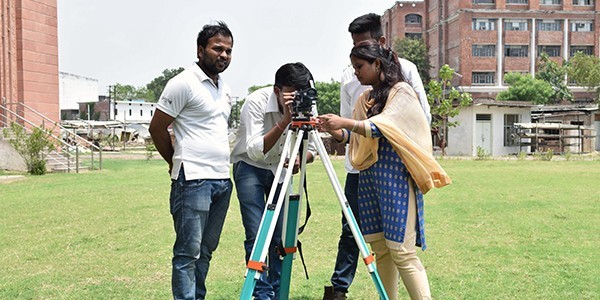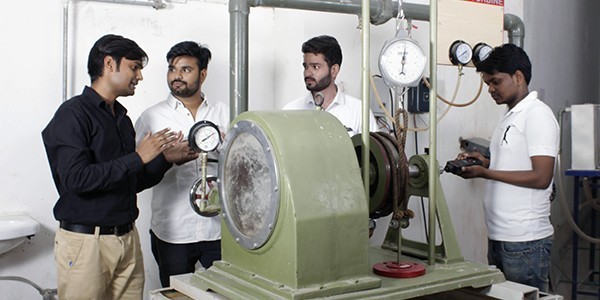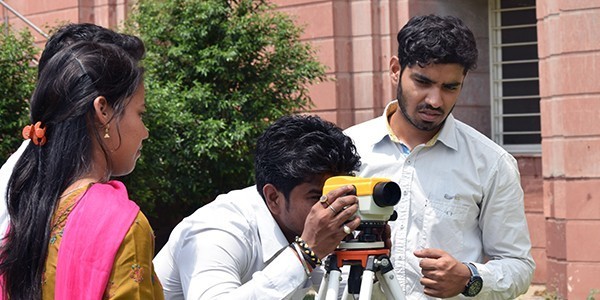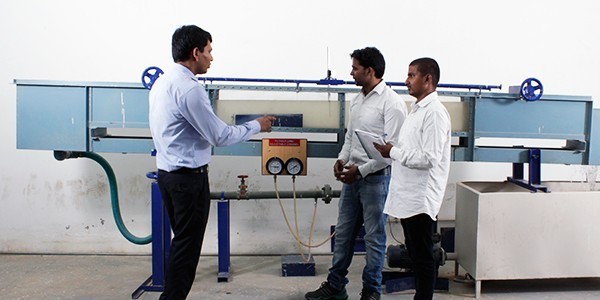M. Tech – Environmental
Educational Objectives
Environmental engineering aims at improving the quality of, and safeguarding, human lives by curing and preventing various environmental issues.
M.Tech. in Environmental Engineering is amongst the most well-planned courses at BBDU (best Environmental Engineering college in Lucknow). The demand for capable and dedicated Environmental Engineers in our country has been steadily rising in the past decade, mostly with the advancement of the industrial age on one hand and the need for conservation of the environment on the other.
M.Tech. in Environmental Engineering at BBDU is an in-depth learning and understanding of the pollution water treatment cycles, air and noise pollution, solid waste management systems etc. While the knowledge of all this is very important, equally important is the will and ability to apply such knowledge as per the demand of the situation. Thus, BBDU, the best M.Tech college in Lucknow, continues to fulfill the following educational objectives:
- In-depth theoretical learning in classes under the tutelage of highly learned and experienced teachers
- Practical understanding through state-of-the-art technology in labs under the guidance of specially trained teachers
- Application and problem-solving skill development through mandatory trainings or/and projects
- Accumulating deeper understanding of subjects from a vast number of available books, international e-journals, research and scientific papers etc
Opportunities For Environmental Engineers
The population of the human race will continue to increase, and with this increasing population, two things are bound to happen simultaneously:
- The pollution caused by the human population will increase proportionately with the increase in the human population
- The pollution caused in order to meet the increasing demands of this increasing population, increases with its size (setting up of factories, increase in production, increase in wastes and other pollutants, and so on).
Thus, the role of Environmentalists is only going to increase in the coming years and, in turn, the jobs and similar opportunities with justifiable monetary remunerations will tend to increase too.
Some of the jobs offered to candidates, in terms of both research and regular jobs, who complete this course successfully are:
- Environmental Engineer/Officer
- Research Assistant/Scholar
- Health Inspector
- Health & Safety Engineer
- PWD engineers
- Sanitation Officer
- Water treatment Officer
Program Outcomes
| PO1 | Engineering Knowledge: Apply the knowledge of mathematics , science , engineering fundamentals and an engineering specialization to the solution of complex engineering problems. |
| PO2 | Problem Analysis: Identify , formulate , review literature and analyze complex engineering problems reaching substantiated conclusions using first principles of mathematics , natural science and engineering sciences . |
| PO3 | Design / Development of Solutions: Design solutions for complex engineering problems and design system components or processes that meet the specified needs with appropriate consideration for the public health and safety and the cultural , societal and environmental considerations . |
| PO4 | Conduct Investigations of Complex problems: Use research based knowledge and research methods including design of experiments, analysis and interpretation of data, and synthesis of the information to provide valid conclusions. |
| PO5 | Modern Tool Usage: Create , Select , and apply appropriate techniques , resources and modern engineering and IT tools including prediction and modeling to complex engineering activities with an understanding of the limitations . |
| PO6 | The Engineer and Society: Apply reasoning informed by the contextual knowledge to assess societal , health , safety , legal and cultural issues and the consequent responsibilities relevant to the professional engineering practice . |
| PO7 | Environment and Sustainability: Understand the impact of the professional engineering solutions in societal and environmental context and demonstrate the knowledge of , and need for sustainable development . |
| PO8 | Ethics: Apply ethical principles and commit to professional ethics and responsibilities and norms of the engineering practice . |
| PO9 | Individual and Team Work: Function effectively as an individual and as a member or leader in diverse teams and in multidisciplinary settings . |
| PO10 | Communication: Communicate effectively on complex engineering activities with the engineering community and with the society at large , such as , being able to comprehend and write effective reports and design documentation , make effective presentations, and give and receive clear instructions. |
| PO11 | Project Management and Finance: Demonstrate knowledge and understanding of the engineering and management principles and apply these to one’s own work , as a member and leader in a team , to manage projects and in multidisciplinary environments. |
| PO12 | Life Long Learning: Recognize the need for , and have the preparation and ability to engage in independent and life long learning in the broadcast of technological change . |
Program Specific Outcomes
| PSO1 | To expose the students with the working culture of industry as well as research |
| PSO2 | Assess the Environmental impact of various projects and take required measures to curb Environmental deterioration |
Syllabus
Apply Now
Error: Contact form not found.
Engineering Courses
Labs
- Surveying Lab
- Fluid Mechanics Lab
- Engineering Geology Lab
- Civil Engineering Material Lab
- Quantity Survey & Estimation Lab
- Civil Engineering Drawing Lab
- Geoinformatics Lab
- Hydraulic Machine Lab
- Geotechnical Engineering Lab
- Environmental Engineering Lab
- Cad Lab
- Cad Lab 1
- Cad Lab 2
- Transportation Engineering Lab
- Structural Detailing Lab
- Air & Noise Pollution Lab
- Concrete Structure Lab
- Traffic Survey & Analysis Lab
- Water & Waste Water Treatment Lab
Old Syllabus
[pdf-light-viewer id=”8697″]








